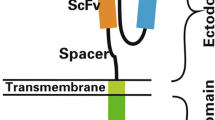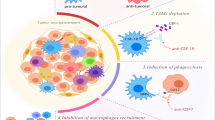Abstract
Background
Tolerogenic dendritic cells (tDCs) are considered a novel therapeutic tool in treating autoimmune diseases, allergies, and transplantation reactions. Among numerous pharmacological immune modulators, dexamethasone (Dex) is known to induce potent tolerogenicity in DCs generated from human monocytes with granulocyte–macrophage colony-stimulating factor (GM-CSF) and interleukin-4 (IL-4), and these cells (IL-4-DCs/Dex) are being appraised as a tDC-based platform in clinical settings. Interferon-α (IFNα) represents another powerful inducer of monocyte-derived DCs, which possess higher migratory activity and stability. However, the functions of IFN-DCs/Dex have not been sufficiently analyzed and there are no comparative studies of the tolerogenicity of IFN-DCs/Dex and IL-4-DCs/Dex. This study aimed to investigate the properties of IFN-DCs/Dex in comparison with IL-4-DCs/Dex.
Results
DCs were obtained by cultivation of an adherent fraction of peripheral blood mononuclear cells (MNCs) in the presence of GM-CSF and IFNα or IL-4 with subsequent lipopolysaccharide-driven maturation. Dex (10−6 M) was added to the cultures at day 3. We showed that generation of IFN-DCs with Dex resulted in decrease in percentage of CD83+ and CD86+ DCs and increase in numbers of CD14+, B7-H1+, and Toll-like receptor 2 (TLR2+) DCs. Treatment with Dex downregulated pro-inflammatory cytokine production, reduced DC allostimulatory activity, and inhibited DC capacity to stimulate Th1/pro-inflammatory cytokine production, altogether evidencing the induction of a tolerogenic phenotype. As compared to IL-4-DCs/Dex, IFN-DCs/Dex were characterized by larger proportion of TLR2+ and CD14+ cells, higher production of IL-10 and lower TNFα/IL-10 ratio, more potent capacity to induce T cell anergy, and more efficiently skewed T cell cytokine balance towards Th2/anti‐inflammatory profile.
Conclusions
The data obtained indicate that potent tDCs could be generated by treating IFN-DCs with dexamethasone. The tolerogenic properties of IFN-DCs/Dex are better than or at least equal to those of the IL-4-DCs/Dex, as assessed by in vitro phenotypic and functional assays, suggesting these cells as a new tolerogenic vaccine platform.


Similar content being viewed by others
Abbreviations
- DCs:
-
Dendritic cells
- Dex:
-
Dexamethasone
- IFN-DCs:
-
Interferon-α-induced DCs
- IL-4-DCs:
-
Interleukin-4-induced DCs
- MLR:
-
Mixed leukocyte reactions
- MNCs:
-
Mononuclear cells
- tDCs:
-
Tolerogenic dendritic cells
References
Canning M, Grotenhuis K, de Wit H, Drexhage H (2000) Opposing effects of dehydroepiandrosterone and dexamethasone on the generation of monocyte-derived dendritic cells. Eur J Endocrinol 143:687–695
Chamorro S (2009) TLR triggering on tolerogenic dendritic cells results in TLR2 up-regulation and a reduced proinflammatory immune program. J Immunol 183:2984–2994
Della Bella S, Nicola S, Riva A, Biasin M, Clerici M, Villa M (2004) Functional repertoire of dendritic cells generated in granulocyte macrophage-colony stimulating factor and interferon-alpha. J Leukoc Biol 75:106–116
Domogalla MP, Rostan PV, Raker VK, Steinbrink K (2017) Tolerance through education: how tolerogenic dendritic cells shape immunity. Front Immunol 8:1764. https://doi.org/10.3389/fimmu.2017.01764.eCollection
Franzke A, Piao W, Lauber J, Gatzlaff P, Kцnecke C, Hansen W, Schmitt-Thomsen A, Hertenstein B, Buer J, Ganser A (2003) G-CSF as immune regulator in T cells expressing the G-CSF receptor: implications for transplantation and autoimmune diseases. Blood 102(2):734–739
Garcia-Gonzalez P, Morales R, Hoyos L, Maggi J, Campos J, Pesce B, Gárate D, Larrondo M, González R, Soto L, Ramos V, Tobar P, Molina MC, Pino-Lagos K, Catalán D, Aguillyn JC (2013) A short protocol using dexamethasone and monophosphoryl lipid A generates tolerogenic dendritic cells that display a potent migratory capacity to lymphoid chemokines. J Transl Med 11:128. https://doi.org/10.1186/1479-5876-11-128
Gessani S, Conti L, Del Cornt M, Belardelli F (2014) Type I interferons as regulators of human antigen presenting cell functions. Toxins (Basel) 6:1696–1723
Gordon J, Ma Y, Churchman L, Gordon S, Dawicki W (2014) Regulatory dendritic cells for immunotherapy in immunologic diseases. Front Immunol 5:7. https://doi.org/10.3389/fimmu.2014.00007
Gottenberg J, Chiocchia G (2007) Dendritic cells and interferon-mediated autoimmunity. Biochimie 89:856–871
Harry R, Anderson A, Isaacs J, Hilkens C (2010) Generation and characterization of therapeutic tolerogenic dendritic cells for rheumatoid arthritis. Ann Rheum Dis 69:2042–2050
Hartung T, Docke W, Gantner F, Krieger G, Sauer A, Stevens P, Volk H, Wendel A (1995) Effect of granulocyte colony-stimulating factor treatment on ex vivo blood cytokine response in human volunteers. Blood 85:2482–2489
Hilkens C, Isaacs J (2010) Tolerogenic dendritic cells in clinical practice. Open Arthritis J 3:8–12
Hilkens C, Isaacs J, Thomson A (2010) Development of dendritic cell-based immunotherapy for autoimmunity. Int Rev Immunol 29:156–183
Hubo M, Trinschek B, Kryczanowsky F, Tuettenberg A, Steinbrink K, Jonuleit H (2013) Costimulatory molecules on immunogenic versus tolerogenic human dendritic cells. Front Immunol 4:82. https://doi.org/10.3389/fimmu.2013.00082
Kurochkina Y, Leplina O, Tikhonova M, Tyrinova T, Batorov E, Sizikov A, Ostanin A, Chernykh E (2016) Effect of dexamethasone on interferon-α-induced differentiation of monocytes to dendritic cells. Med Immunol 18(4):347–356. https://doi.org/10.15789/1563-0625-2016-4-347-356 (in Russian)
Manoharan I, Hong Y, Suryawanshi A, Angus-Hill M, Sun Z, Mellor AL, Munn D, Manicassamy S (2014) TLR2-dependent activation of β-catenin pathway in dendritic cells induces regulatory responses and attenuates autoimmune inflammation. J Immunol 193(8):4203–4213. https://doi.org/10.4049/jimmunol.1400614
Matasić R, Dietz A, Vuk-Pavlovic S (1999) Dexamethasone inhibits dendritic cell maturation by redirecting differentiation of a subset of cells. J Leukoc Biol. 66:909–914
Morris E, MacDonald K, Rowe V, Johnson D, Banovic T, Clouston A, Hill G (2004) Donor treatment with pegylated G-CSF augments the generation of IL-10-producing regulatory T cells and promotes transplantation tolerance. Blood 103:3573–3581
Naranjo-Gymez M, Raпch-Reguй D, Onate C, Grau-Lypez L, Ramo-Tello C, Pujol-Borrell R, Martнnez-Cáceres E, Borras FE (2011) Comparative study of clinical grade human tolerogenic dendritic cells. J Transl Med 9:89
Osorio F, Fuentes C, Lypez MN, Salazar-Onfray F, Gonzalez FE (2015) Role of dendritic cells in the induction of lymphocyte tolerance. Front Immunol 6:535. https://doi.org/10.3389/fimmu.2015.00535.eCollection
Paquette R, Hsu N, Kiertscher S, Park A, Tran L, Roth M, Glaspy J (1998) Interferon-alpha and granulocyte-macrophage colony-stimulating factor differentiate peripheral blood monocytes into potent antigen-presenting cells. J Leukoc Biol 64:358–367
Piemonti L, Monti P, Allavena P, Sironi M, Soldini L, Leone B, Socci C, Di Carlo V (1999) Glucocorticoids affect human dendritic cell differentiation and maturation. J Immunol 162:6473–6481
Rea D, van Kooten C, van Meijgaarden K, Melief Offringa R (2000) Glucocorticoids transform CD40-triggering of dendritic cells into an alternative activation pathway resulting in antigen presenting cells that secrete IL-10. Blood 95:3162–3167
Rozkova D, Horvath R, Bartunkova J, Spisek R (2006) Glucocorticoids severely impair differentiation and antigen presenting function of dendritic cells despite up-regulation of Toll-like receptors. Clin Immunol 120:260–271
Sagiv-Barfi I, Czerwinski D, Levy S, Alam I, Mayer A, Gambhir S, Levy R (2018) Eradication of spontaneous malignancy by local immunotherapy. Sci Transl Med 10:eaan4488
Santini S, Lapenta C, Logozzi M, Parlato S, Spada M, di Pucchio T, Belardelli F (2000) Type I interferon as a powerful adjuvant for monocyte-derived dendritic cell development and activity in vitro and in Hu-PBL-SCID mice. J Exp Med 191:1777–1788
Thomson A, Robbins P (2008) Tolerogenic dendritic cells for autoimmune disease and transplantation. Ann Rheum Dis 67(Suppl 3):90–96
Thurner B, Rцder C, Dieckmann D, Heuer M, Kruse M, Glaser A, Keikavoussi P, Kдmpgen E, Bender A, Schuler G (1999) Generation of large numbers of fully mature and stable dendritic cells from leukapheresis products for clinical application. J Immunol Methods 223:1–15
Ukyo N, Hori T, Yanagita S, Ishikawa T, Uchiyama T (2003) Costimulation through OX40 is crucial for induction of an alloreactive human T-cell response. Immunology 109(2):226–231
Unger W, Laban S, Kleijwegt F, van der Slik A, Roep B (2009) Induction of T-reg by monocyte-derived DC modulated by vitamin D3 or dexamethasone: differential role for PD-L1. Eur J Immunol 39:3147–3159
Valente J, Alexander J, Li B, Noel J, Custer D, Ogle J, Ogle C (2002) Effect of in vivo infusion of granulocyte colony-stimulating factor on immune function. Shock 17:23–29
Van Kooten C, Stax A, Woltman A, Gelderman K (2009) Handbook of experimental pharmacology “dendritic cells”: the use of dexamethasone in the induction of tolerogenic DCs. Handb Exp Pharmacol 188:233–249. https://doi.org/10.1007/978-3-540-71029-5-11
Woltman A, Vander Kooij S, De Fijter J, van Kooten C (2006) Maturation-resistant dendritic cells induce hyporesponsiveness in alloreactive CD45RA+ and CD45RO+T-cell populations. Am J Transplant 6:2580–2591
Xia CQ, Peng R, Beato F, Clare-Salzler M (2005) Dexamethasone induces IL-10-producing monocyte-derived dendritic cells with durable immaturity. Scand J Immunol 62:45–54
Acknowledgements
The authors thank A. Delvig for a professional language editing service.
Author information
Authors and Affiliations
Corresponding author
Ethics declarations
Conflict of interest
The authors declare that they have no competing interests.
Ethics approval and consent to participate
Our research involved whole blood samples from healthy donors after receiving written informed consent. The study was approved by the Ethics Committee of the Institute of Fundamental and Clinical Immunology on March 14, 2017.
Additional information
Publisher's Note
Springer Nature remains neutral with regard to jurisdictional claims in published maps and institutional affiliations.
Rights and permissions
About this article
Cite this article
Leplina, O., Kurochkina, Y., Tikhonova, M. et al. Dendritic cells generated in the presence of interferon-α and modulated with dexamethasone as a novel tolerogenic vaccine platform. Inflammopharmacol 28, 311–319 (2020). https://doi.org/10.1007/s10787-019-00641-1
Received:
Accepted:
Published:
Issue Date:
DOI: https://doi.org/10.1007/s10787-019-00641-1




